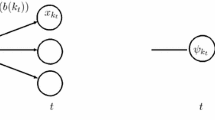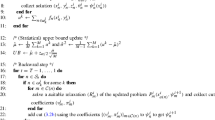Abstract
A model of multistage stochastic programming over a scenario tree is developed, in whichthe evolution of information states, as represented by the nodes of a scenario tree, is supplementedby a dynamical system of state vectors controlled by recourse decisions. A dualproblem is obtained in which multipliers associated with the primal dynamics are pricevectors that are propagated backward in time through a dual dynamical system involvingconditional expectation. A format of Fenchel duality is employed in order to have immediatespecialization not only to linear programming but also to extended linear‐quadratic programming.The resulting optimality conditions support schemes of decomposition in which aseparate optimization problem is solved at each node of the scenario tree.
Similar content being viewed by others
References
R.T. Rockafellar and R.J-B Wets, Generalized linear-quadratic problems of deterministic and stochastic optimal control in discrete time, SIAM J. Control Opt. 28(1990)810–822.
L. Korf, Approximation and solution schemes for dynamic stochastic optimization problems, Ph.D. Dissertation, Dept. of Mathematics, University of California at Davis, 1998.
R.T. Rockafellar, Linear-quadratic programming and optimal control, SIAM J. Control and Opt. 25 (1987)781–814.
R.T. Rockafellar, Multistage convex programming and discrete-time optimalcontrol, Control and Cybernetics 17(1988)225–246.
D.H. Salinger, A splitting algorithm for multistage stochastic programming with application to hydropower scheduling, Ph.D. Dissertation, Dept. of Applied Math., University of Washington, 1997.
J. Eckstein and M.C. Ferris, Operator splitting methods for monotone affine variational inequalities with a parallel application to optimal control, INFORMS J. on Computing 10(1998) no. 2.
G.H.-G. Chen, Forward-backward splitting techniques: Theory and applications, Ph.D. Dissertation, Dept. of Applied Math., University of Washington, 1994.
G.H.-G. Chen and R.T. Rockafellar, Convergence rates in forward-backward splitting, SIAM J. Optim. 7(1997)421–444.
R.T. Rockafellar and R.J-B Wets, Variational Analysis, Grundlehren der Mathematischen Wissenschaften 317, Springer, 1997.
R.T. Rockafellar, Duality theorems for convex functions, Bull. Amer. Math. Soc. 70(1964)189–192.
R.T. Rockafellar and R.J-B Wets, A Lagrangian finite generation technique for solving linear-quadratic problems in stochastic programming, Math. Programming Studies 28(1986)63–93.
R. T. Rockafellar and R.J-B Wets, Linear-quadratic problems with stochastic penalties: The finite generation algorithm, in: Stochastic Optimization, eds. V.I. Arkin, A. Shiraev and R.J-B Wets, Springer Lecture Notes in Control and Information Sciences No. 81, 1987, pp. 545–560.
R.T. Rockafellar, Duality and stability for extremum problems involving convex functions, Pacific J. Math. 21(1967)167–187.
R.T. Rockafellar, Lagrange multipliers and optimality, SIAM Review 35(1993)183–238.
Rights and permissions
About this article
Cite this article
Rockafellar, R. Duality and optimality in multistagestochastic programming. Annals of Operations Research 85, 1–19 (1999). https://doi.org/10.1023/A:1018909508556
Issue Date:
DOI: https://doi.org/10.1023/A:1018909508556




